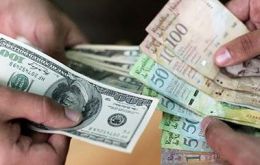MercoPress. South Atlantic News Agency
Economy
-
Wednesday, October 1st 2014 - 08:09 UTC
US calls on Argentina “to normalize relations with all bondholders”

While the US State Department again called Tuesday on Argentina 'to normalize relations with all its bondholders’, the government of President Cristina Fernandez deposited a 161 million dollars bond interest payment with a newly appointed local trustee on Tuesday, defying a U.S. judge who held Argentina in contempt of court on Monday for taking illegal steps to meet its debt obligations.
-
Tuesday, September 30th 2014 - 22:50 UTC
Argentina/China trade forecasted to boom in Yuan-denominated operations

Trade between Argentina and China could see a rise in Yuan-denominated operations after the bilateral currency swap deal that was sealed earlier this year, according to key leaders of the Sino-Argentine business community in Buenos Aires.
-
Tuesday, September 30th 2014 - 07:00 UTC
Cristina Fernandez claims US is responsible for Judge Griesa's decision

President Cristina Fernandez said US Judge Thomas Griesa decision to declare Argentina 'in contempt of court' in the dispute with speculative funds, was in violation of international law, the UN chart and the OAS (Organization of American States) chart.
-
Tuesday, September 30th 2014 - 05:11 UTC
Argentine reserves below 28bn dollars; bonds payments of 170m on Tuesday

The informal of “blue” dollar in Argentina fell back 15 cents to 15.55 Pesos after it skyrocketed 75 cents last week and scraping 16 Pesos. The formal US dollar meantime advanced three cents to 8.49 Pesos at the end of trading in Buenos Aires City banks and foreign exchange offices. The gap between the two rates dropped to 83.9%.
-
Tuesday, September 30th 2014 - 04:55 UTC
Brazil will give exporters 3% tax refunds to help struggling businesses

The Brazilian government will offer tax rebates for exporters beginning in October, Finance Minister Guido Mantega said on Monday, in the latest measure to help struggling businesses just days ahead of a presidential election.
-
Monday, September 29th 2014 - 21:16 UTC
Judge Griesa declares Argentina in contempt of court, but deferred financial penalties

New York district judge Thomas Griesa declared on Monday Argentina in contempt of court, due to the country's actions in attempting to change debt jurisdictions as a result of the ongoing judicial conflict with holdout investors presided over by the US magistrate.
-
Monday, September 29th 2014 - 09:22 UTC
Venezuela's Bolivar hits a record low of 100 to the US dollar

Venezuela's Bolivar currency hit a record low 100 to the U.S. dollar on the black market on Friday, making the dollar 16 times more expensive than the strongest official rate, according to a website that tracks it.
-
Monday, September 29th 2014 - 08:54 UTC
Uruguay needs to improve infrastructure, “especially roads and port facilities”

Finland's UPM, one of the largest forestry groups in the world, does not intend for the moment to build any new pulp mills in Uruguay, said Jaakko Sarantola, vice president of the cellulose division of the company, who also pointed out that Uruguay needs to improve infrastructure to facilitate logistics.
-
Monday, September 29th 2014 - 08:47 UTC
Opening the economy “would be a disaster for Brazilian industry” states Rousseff minister

Anticipating what could be policy under a second government of President Dilma Rousseff, her Trade Minister Mauro Borges told Brazilian daily Folha do Sao Paulo that opening the country to more foreign trade would be a “disaster for Brazilian industry” and lead to the “mexicanization” of the economy, in reference to the light assembly factories known as “maquiladoras” that dominate Mexico’s non-oil exports.
-
Monday, September 29th 2014 - 08:39 UTC
Argentine stats on economic growth again come under suspicion

Argentina’s government released some hopeful economic statistics last week with numbers showing that the economy climbed out of recession in the last quarter. But with skepticism over the numbers, combined with a free-falling peso, in light of Argentina’s debt dispute with holdout creditors, economists still have a grim outlook the Mercosur member economy.
